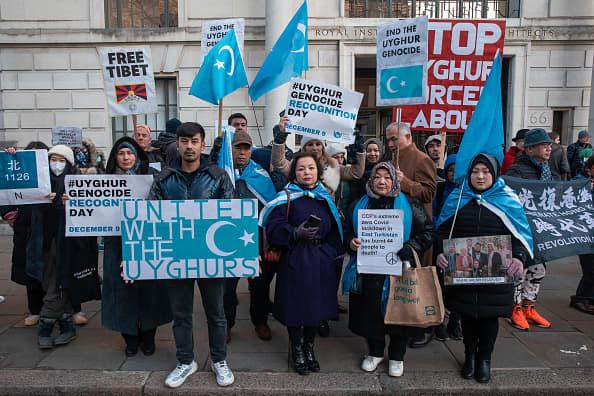
China’s growing global influence poses a serious threat to international human rights, according to a new report, which suggests that the United Nations Human Rights Council — the body established to safeguard such international protections — is failing to counter the risks.
The UNHRC is an inter-governmental body made up of 47 U.N. member states, which are elected on a three-year rotational basis with the stated aim of strengthening the “promotion and protection of human rights” globally.
Yet research released Thursday by risk and strategic consulting firm Verisk Maplecroft suggests that it has instead become a “battleground for competing standards,” with China and allied member states showing signs of “watering down international action” and pushing their “own brand of human rights.”
Of particular note, it said that China was pushing a “statist ‘development first’ view of human rights” on council members and undermining individual freedoms by “emphasizing economic development above all other rights.”
China’s ministry of foreign affairs did not immediately respond to a CNBC request for comment on the findings.
Beijing’s increasingly active role in the international human rights system comes at a precarious period of global democratic deterioration.Sofia Nazalyasenior human rights analyst at Verisk Maplecroft
The research, part of the firm’s wider annual Human Rights Outlook, is based on quantitative data from sources including the U.N., the U.S. State Department and Human Rights Watch, as well as Verisk Maplecroft’s internal qualitative analysis.
It also found that China is using its economic power to sway council votes, with grantees of China’s “Belt & Road Initiative” most susceptible to influence.
At least 35 of the 47 UNHRC member states belong to the BRI — China’s global infrastructure development project — many of which are Asian or African countries with similar, or worse, scores on the company’s human rights indices, the study noted.
UNHRC acting spokesperson, Pascal Sim, rejected the claims, stating that “no one state runs the council or dominates the agenda.”
“All states, big and small, have an equal voice and immense potential to inform and influence the action of this intergovernmental body charged with promoting and protecting human rights around the world,” Sim added in emailed comments to CNBC.
Political maneuvering
Among its criticism, the report highlighted China’s approach to civil and political rights — and chiefly freedom of speech and expression — as particularly concerning.
Such behavior was being echoed by other UNHRC states, it said, with almost three-quarters (70%) of current members ranking as high or extreme risks for such rights. Those include Eritrea, Somalia, Sudan, Pakistan and Bangladesh. Spokespersons for the respective governments did not immediately respond to CNBC requests for comment.
More than half of members also ranked similarly poorly across the three other metrics the research deemed essential for upholding humanitarian protections: labor rights, human security and human development.
Of the 30 members that rated as extreme or high risk for labor rights, 18 recorded a drop in their score from 2017, 15 of which were BRI signatories.
The report also found that China was using increasingly sophisticated maneuvering of key UNHRC mechanisms to contain criticism, with states increasingly partaking in the whitewash of Beijing’s rights record.
It said the most “astounding diplomatic victory” came with the rejection of a U.S.-proposed draft resolution on holding a debate on Xinjiang in October 2022, which was backed by Muslim-majority states and BRI signatories including Indonesia, the UAE and Qatar.
Human rights groups accuse Beijing of abuses against Uyghurs, a mainly Muslim ethnic minority group indigenous to the Xinjiang Uyghur Autonomous Region in Northwest China. The U.S. has accused China of committing genocide. Beijing has vigorously denied it carries out any abuses.
The findings come at a time of heightened Western skepticism toward China, with U.S. and European allies raising various concerns ranging from the potential national security threats posed by Chinese technology to Beijing’s alliance with Moscow.
“Beijing’s increasingly active role in the international human rights system comes at a precarious period of global democratic deterioration, economic slowdown and severe geopolitical polarization — all with knock-on effects on human rights,” Sofia Nazalya, senior human rights analyst at Verisk Maplecroft and the report’s author, said.
“The upshot is that international human rights norms may weaken at the expense of vulnerable populations, while businesses will have to navigate and decode competing, and often conflicting, views on what constitutes an abuse and what doesn’t from the Council itself.”
Separate analysis released Tuesday found that China has significantly increased its bailout lending for distressed nations over recent years, loaning $185 billion to BRI debtors in the past five years alone.
The report, which was co-authored by the World Bank, said the uptick marked a shift toward a more “opaque and uncoordinated” global system for cross-border rescue lending, which threatens to undermine existing monetary architecture and the role of traditional institutions like the International Monetary Fund.
On Monday, Amnesty International released its latest “the state of the world’s human rights” report, in which it said that the world had experienced increased war crimes, crimes against humanity, repression of universal freedoms, economic crises and rising inequality over the past year.
Source: CNBC
